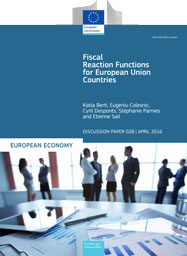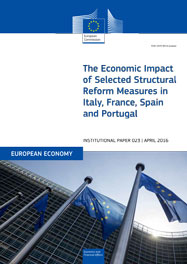Micossi, Stefano, Bruzzone, Ginevra, Cassella,Miriam, (2016), “Fine-tuning the use of bail-in to promote a stronger EU financial system”, CEPS Special Report No. 136 / Απρίλιος 2016 This paper discusses the application of the new European rules for burden-sharing and bailin in the banking sector, in view of their ability to accommodate broader policy goals of aggregate financial stability. It finds that the Treaty principles and the new discipline of state aid and …Read More
Origins of Reform Resistance and the Southern European Regime
Heinemann, Friedrich, Grigoriadis Theocharis, (2015), “Origins of Reform Resistance and the Southern European Regime”, ZEW Working Paper no 20, Ιούλιος 2013 This analysis deals with reform obstacles in general and with the particular challenges of institutional change under the conditions of Southern Europe in particular. It presents a survey on the possible drivers of reform resistance. This includes very different qualities of approaches ranging from classical economics and politicaleconomic explanations to more …Read More
Towards a fiscal union for the Eurozone
Allard, Céline, Bluedorn, John C, (2016), “Towards a fiscal union for the Eurozone”, Voxeu, 22 Απριλίου European fiscal rules were too loosely implemented to ensure that public finances were managed appropriately across the cycle in member states. Weak fiscal policies in some countries before the crisis left them ill prepared when adverse shocks manifested. Windfalls from lower interest and debt payments were not saved, higher revenues generated by unsustainable domestic …Read More
Fiscal Reaction Functions for European Union Countries
Berti, Katia, Colesnic, Eugeniu, Desponts, Cyril, Pamies, Stephanie, Sail, Etienne, (2016), “Fiscal Reaction Functions for European Union Countries”, European Commission, Discussion Paper 28, Απρίλιος This paper estimates country-specific fiscal reaction functions (FRFs) for selected European countries and tests for a change in fiscal behaviour since the beginning of the economic and financial crisis. The estimated country-specific FRFs, as well as a panel FRF for Central and Eastern European countries, are used in medium-term projections …Read More
Household debt and the transmission of monetary policy: New evidence
Cloyne, James, Ferreira, Clodomiro F.,Surico, Paolo, (2016), “Household debt and the transmission of monetary policy: New evidence”, Voxeu, 21 Απριλίου Monetary policy has significantly heterogeneous effects on private consumption, which depend on the household’s debt and balance sheet position. This column suggests that households with mortgage debt behave in a liquidity-constrained manner, while those without are far less sensitive to movements in interest rates. Though the direct channel of monetary transmission – i.e. …Read More
Measuring the quality of jobs in OECD countries
Scarpetta, Stefano, Cazes, Sandrine, Garnero, Andrea, (2016), “Measuring the quality of jobs in OECD countries”, Voxeu, 21 Απριλίου ob quality plays a significant role in individuals’ well-being as well as promoting labour force participation, productivity, and economic performance. But it can be an elusive concept if not grounded in hard data. This column presents a new OECD framework to measure and assess the quality of jobs based on three measurable dimensions – earnings …Read More
The Case Against Helicopter Money
Heise, Michael, (2016), “The Case Against Helicopter Money”, Project Syndicate, 20 Απριλίου Despite years of expansionary monetary policy, the European Central Bank has failed to push inflation back up to its target of “below but close to 2%.” The latest measures – a zero interest rate on the ECB’s main refinancing operations, an increase in monthly asset purchases from €60 billion ($67 billion) to €80 billion, and an even lower deposit …Read More
Public finances in Europe: fortifying EU economic governance in the shadow of the crisis
Laffan, Brigid, Schlosser, Pierre, (2016), “Public finances in Europe: fortifying EU economic governance in the shadow of the crisis”, Journal of European Integration, 8 Μαρτίου The Eurozone crisis resulted in a decisive change of Europe’s fiscal surveillance regime that brought the question of public finance oversight sharply into focus. The Stability and Growth Pact, the fiscal cornerstone of Europe’s Economic and Monetary Union (EMU), was fortified, expanded and supplemented by the so-called …Read More
The Economic Impact of Selected Structural Reform Measures in Italy, France, Spain and Portugal
European Commission, (2016), “The Economic Impact of Selected Structural Reform Measures in Italy, France, Spain and Portugal”, Institutional Paper 023, Απρίλιος This paper presents a rigorous methodology for analysing the potential impact of structural reforms by looking at actual measures in four Member States (Italy, France, Spain and Portugal). The model simulations show that the selected reform measures examined could have significant economic benefits in terms of GDP and employment. …Read More
Who Reforms for Higher Productivity?
Van der Marel, Erik, (2016), “Who Reforms for Higher Productivity?”, European Centre for International Political Economy, Μάρτιος With weak European growth performance over a longer period of time, it is time to push reforms raising the rate of productivity growth. The EU’s best strategy for it is to cut restrictions for single market trade in the services sector. There are still major restrictions in place and services regulations differ substantially between …Read More






